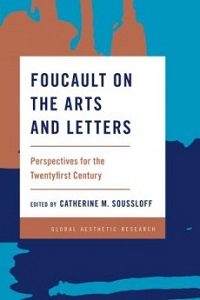Congratulations to Professor Catherine M. Soussloff on the publication of her new book, Foucault on the Arts and Letters, a collection of twelve essays addressing Foucault’s thought and its impact on thinking about the visual arts, literature, and aesthetic discourse in the twenty-first century.


The edited volume grew out of a conference jointly sponsored by the Institut d’Études Avancées de Paris and the Peter Wall Institute for Advanced Studies at UBC, and was held in Paris on June 12–13, 2014.
The book includes essays by Anton Lee and Marisa Sánchez (PhD candidates in the Department of Art History, Visual Art and Theory), Brandon Konoval (UBC School of Music), Sima Godfrey (UBC Department of French, Hispanic and Italian Studies), and editor Catherine M. Soussloff.
In “The Photogenic Invention of Thought-Emotion,” Anton Lee explores Foucault’s sole essay on photography and his last published text on the visual arts, the essay on his American contemporary Duane Michals.
In “Foucault’s Beckett,” Marisa Sánchez examines the significance of the major literary work of Samuel Beckett for Foucault’s approach to language and representation, particularly at the crucial moment of his election to the Collège de France in 1970.
In “Deleuze on Foucault: The Recourse to Painting,” Catherine M. Soussloff argues that Deleuze’s assessment of Foucault’s philosophy indicates the strength that painting maintained as both a historical tool and a conceptual methodology in a system conceived of as centrally concerned with vision and visibility as a way of understanding the situation of the subject in the world.
Copies of Foucault on the Arts and Letters can be ordered directly from publisher Rowman and Littlefield, or through online retailers Amazon and Indigo.
Praise for Foucault on the Arts and Letters:
“This collection demonstrates the continuing productivity of Foucault’s thinking for understanding a surprisingly wide range of the arts: literature, painting, photography, even dance and music. The essayists offer insightful commentaries on concepts such as archaeology, heterotopia, and the aesthetics of existence, while interpreting Foucault’s explorations on figures from Shakespeare to Beckett, from Bosch to Bacon, and many others.”
– Gary Shapiro, Tucker-Boatwright Professor in the Humanities-Philosophy, University of Richmond


